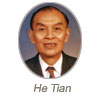AWARDEE OF TECHNOLOGICAL SCIENCES PRIZE
WANG DEXI
Abstract
Prof. Wang Dexi, a famous expert of nuclear chemistry and chemical engineering, was born in Beijing in 1913. He graduated from Tsinghua University in 1935. In 1940, he was granted a scholarship for graduate study in the United States and entered the Department of Chemical Engineering of Massachusetts Institute of Technology. In 1946, he received his doctorate. In 1947, he joined the Department of Chemical Engineering of Nankai University, as a professor. In 1952, he was transferred to Tianjin University as the head of the Department of Chemical Engineering. In 1960, he was transferred to the Second Ministry of Machinery and was appointed the deputy director of Institute of Atomic Energy. He was elected the Member of Chinese Academy of Sciences in 1980.
Prof. Wang Dexi was one of the main forerunners and leaders in the field of nuclear & radiochemistry in China. He has contributed a great deal to the foundation and development of China's nuclear industry.
In the early year, Prof. Wang had been engaged in the research and teaching of organic polymer chemistry. He succeeded to the preparations of organic azo compound by electrolytic reduction and of rayon pulp with farm cellulose by-products as raw materials. His doctoral dissertation was on the preparation of sorbitol, a possible substitute for glycerin, by electrolytic reduction of glucose. During those years, sorbitol was classified as a controlled material for military purpose. As a result, this piece of work was not published. In 1949, Prof. Wang worked hard to synthesize plastics with home-made pyrogallol and furfural and obtained a thermosetting plastic, which was the first in the world at that time. In 1958, he succeeded at the synthesis of the glass fiber reinforced plastic of unsaturated polyester, and made a car body with the material.
After 1960, Prof. Wang led and organized the development of the detonator of nuclear weapon ignition neutron source and finally succeeded. He also organized the scientific work concerned to determine the TNT equivalent for several nuclear weapon tests. The above work were favorably appraised and awarded the National Science Congress Prize.
Prof. Wang's most outstanding contribution is in the field of nuclear fuel reprocessing. He actively supported the proposal to change the precipitation process into solvent extraction process. He led the expert team and had done a lot of investigations and tests. The results of the tests provided important scientific basis for the major innovation. In January 1968, a reprocessing pilot plant based on solvent extraction process was put into successful operation at one stroke. This plant timely provided the first batch of plutonium loading for China's nuclear weapon.
In 1983, he was appointed the first Chairman of Science and Technology of China Institute of Atomic Energy. He holds a concurrent post as the member of the Standing Committee of Science and Technology Committee of Nuclear Industry Ministry. In 1990, he was elected to be the third president of the Chinese Nuclear Society. He has also been the awardee of National “May 1st" Labor Medal.






